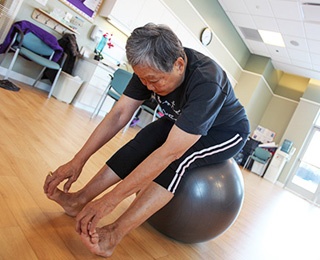April 1, 2021 —Aging causes changes to the brain size, vasculature and cognition, but not every area of the brain is impacted in the same way. The most widely seen cognitive impact associated with age is a change in memory. Fortunately, there is recent scientific evidence showing that people with a relatively high level of physical fitness, whatever their age, tend to perform better on tests evaluating thinking and memory skills than those who are less active.
Research findings about exercise and brain health in older adults
Aging causes changes to the brain size, vasculature and cognition, but not every area of the brain is impacted in the same way. The most widely seen cognitive impact associated with age is a change in memory. Fortunately, there is recent scientific evidence showing that people with a relatively high level of physical fitness, whatever their age, tend to perform better on tests evaluating thinking and memory skills than those who are less active.
One research study found that people who were out of shape in middle age but began exercising later in life appeared to have a lower risk of dementia, benefitting from the significant protective effect that fitness had on the brain. Another found that interval exercise appeared to have the greatest cognitive benefit. Other studies have found that walking for exercise results in a variety of physical (and mental) benefits to the brain.

Exactly how exercise improves and protects brain health is not fully understood. Most researchers suspect that the process involves biochemical reactions that result from exercise. One way that exercise helps promote brain health is apparently by stimulating the increased production of a protein in the liver, GPLD1, that appears to have rejuvenating effects on the brain and memory.
University of Iowa researchers have even found that people can improve their thinking and memory skills even if they aren’t consistent about exercise. A single workout improves cognitive functions and memory in some older people. According to Michelle Voss, assistant professor in the Department of Psychological and Brain Sciences and the study’s author, “In terms of behavioral change and cognitive benefits from physical activity, you can say, ‘I’m just going to be active today. I’ll get a benefit.’”
What you can do to improve brain health
A 2015 survey by the National Center for Health Statistics showed that 20% of people aged 65 and older don’t do any type of formal exercise. The first thing to do is to get moving! There is no one-size-fits all when it comes to physical activity.
- Start slow if you’re new to exercise. While some research shows a correlation between aerobic exercise and benefits for the brain, other studies show benefits from low-intensity mind-body exercises like yoga.
- Aim for 30 minutes of daily exercise, 5 days a week. But don’t be hard on yourself if you skip a session once in a while. Remember, every session helps! Exercise is not an all-or-nothing activity.
- Diversify your routine: aerobic exercise, resistance training, and mind-body exercises are all associated with brain health, even as the full extent of the link between exercise and brain health are still being explored and understood by researchers.
Other habits that support the aging brain
Exercise is just one factor in brain health. There’s more you can and should do to help your brain stay healthy.
- Eat a healthy diet. There is evidence that people who eat a diet focused on fruits, vegetables, fish, nuts, unsaturated oils (olive oil) and plant sources of proteins are less likely to develop cognitive impairment and dementia.
- Manage your blood sugar, blood pressure and cholesterol. Uncontrolled, all of these can have a negative impact on brain health.
- Avoid the overconsumption of alcohol. Excessive drinking is a major risk factor for dementia. If you choose to drink, limit yourself to two drinks a day.
- Be social! Strong social ties have been associated with a lower risk of dementia, as well as lower blood pressure and longer life expectancy.
Stay healthy in retirement
The Admiral at the Lake has over 300 residents who are active, intellectually curious and passionate about the world. Schedule a personalized tour to meet our residents and explore our wellness programs and facilities, including our indoor pool, gym, and exercise studio.